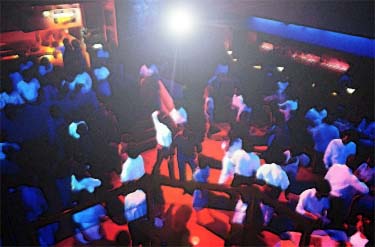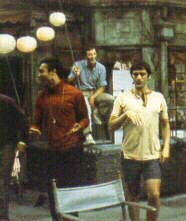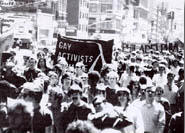 |


|
|
A Survivor of the Gay 70's Looks Back By Jesse Monteagudo
 Before AIDS: For many, the Gay 1970s were marked by wild nights in the disco
Before AIDS: For many, the Gay 1970s were marked by wild nights in the disco
Charles-Maurice de Talleyrand-P�rigord (1754-1838), Napoleon's foreign minister, once said that "he [or she] who has not lived in the years around 1780 has not known the pleasure of life." Talleyrand generalized, of course: Only the upper classes, of which he was a member, could afford to enjoy "the pleasure of life". Talleyrand was also one of the lucky ones, having survived a French Revolution that killed so many of his contemporaries. Most of them might have agreed with Jeanne-Antoinette Poisson, Marquise de Pompadour (1721-1764), who had predicted that "after me, [comes] the deluge." I thought of Talleyrand's quote when I read Rebels, Rubyfruit, and Rhinestones, James T. Sears's history of the lesbian and gay South in the 1970's; a book in which I am one of the "characters".
In this I joined the likes of Jack Fritscher, Brad Gooch, Ethan Mordden, Felice Picano and Edmund White: other veterans from the gay seventies who somehow survived the "deluge" of AIDS and lived to write about it. We should not idealize the period between the Stonewall Uprising and the AIDS epidemic (1969-1981). Like the aristocrats of the Old Regime, only a minority of affluent, white gay men, living in large cities in the United States and Europe, were able to enjoy "the pleasure of [gay] life" in the 1970's. There certainly wasn't much pleasure in being gay in the Southland, outside of large cities like Miami and Atlanta, New Orleans and Houston. Most of those who were openly gay in the seventies' South were, like me, mostly young and poor and naive and very untypical.
If there was anything that characterized the men and women of the "Rubyfruit generation", it was our innocence and our idealism. We really believed that we could make things better, for ourselves and for our brothers and sisters. Though we lost some of our innocence on June 7, 1977, the day the voters of Miami-Dade County repealed their first "gay rights" ordinance, we managed to keep our idealism through the repeated electoral victories of "save our children", the assassination of Harvey Milk, and the "White Night" riots.
In 1979 we partied at the bars and the baths of Washington, DC. In 1987 we mourned our friends around the Names Project Quilt and then we protested outside a Supreme Court that upheld the laws that criminalized our love. We grew up. Still, I do not regret living through the gay seventies, though I would do anything to bring back the many friends I've lost since then. It was wonderful to go through my prime at a time when the drinking age was 18, and when the worst you could get from sex (we thought) could be cured by a trip to the VD Clinic. I was lucky to have a lover at such an uncertain time, and though we have gone on to other relationships, I am glad to say that we are still friends. And though most lesbians and gay men did not get along with each other at the time, I was blessed with wonderful women friends, some of which, like Staci Aker and Esther Weiner, are no longer with us.
And though I've since lost my 1970's innocence, I managed to retain my idealism throughout two decades of grief and disappointment. Thanks to Professor Sears, those of us who survived the deluge can still look back and smile.
|

© 1997-2002 BEI
 The 1970 film, The Boys in the Band, was based on a 1968 play that characterized the internalized self-hate
common to many gay men in the preceding decades.
The 1970 film, The Boys in the Band, was based on a 1968 play that characterized the internalized self-hate
common to many gay men in the preceding decades.
 Rebels, Rubyfruit and Rhinestones showcases the lives of many of the Gay 1970s' characters, including Logan Carter (bottom right of book cover), better known as Roxanne Russell
Rebels, Rubyfruit and Rhinestones showcases the lives of many of the Gay 1970s' characters, including Logan Carter (bottom right of book cover), better known as Roxanne Russell  Despite the party atmosphere in the 1970s, gay activism also flourished
Despite the party atmosphere in the 1970s, gay activism also flourished  Jesse Monteagudo is a freelance writer who lives in South Florida with
his domestic partner. He can be reached at
Jesse Monteagudo is a freelance writer who lives in South Florida with
his domestic partner. He can be reached at